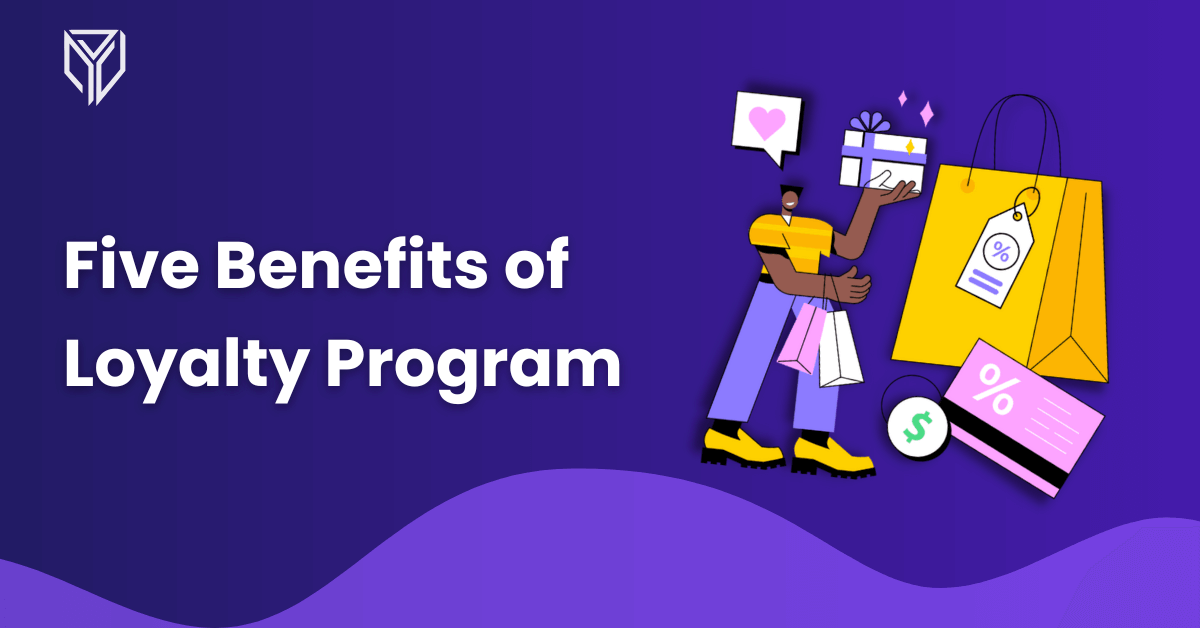
A loyalty program is a marketing strategy that rewards customers for their repeat business and loyalty to a brand or company. Customers are given incentives such as discounts, points, or exclusive offers in exchange for their ongoing business.
The program aims to foster a stronger relationship between the business and the Customer by providing added advantage and value beyond the essential product or service.
Loyalty programs can also provide businesses with valuable customer data that companies can use to improve marketing efforts, products, and services. Ultimately, a loyalty program aims to increase customer retention, encourage repeat business, and boost overall sales.
What makes Loyalty Program Successful?
Building trust and fostering customer loyalty are key objectives for businesses. In fact, a staggering 95% of customers affirm that their trust in a company directly influences their level of loyalty. Simplify the process for customers to earn enticing rewards effortlessly.
How Do Loyalty Programs Benefit Companies?
Businesses benefit from loyalty programmes because they help to build a loyal customer base, increase sales, and improve customer retention. By offering rewards and incentives to customers who make repeat purchases, businesses can encourage customers to continue choosing their brand over competitors.
Furthermore, loyalty programs can give companies insightful information on consumer behaviour and preferences that they can use to improve their marketing strategies and product offerings. Advantages of loyalty program can also help company to differentiate themselves from competitors and build brand awareness. Ultimately, it’s a valuable tool for any business looking to grow and succeed.
1: Increased customer retention
Explanation of Customer Retention
The ability of a company to keep its customers over time is referred to as customer retention. It is a crucial metric for any business, as acquiring new customers is typically more expensive than having existing ones. Customers who are satisfied with the product or service are more likely to make more purchases from the company in the future, according to a high customer retention rate.
Companies can lower churn and develop a devoted customer base by focusing on customer retention, which boosts sales and profitability.
Importance of Customer Retention for Businesses
Customer retention is critical for businesses because it drives profitability and long-term success. Because it lowers marketing and acquisition prices, keeping current customers is generally more cost-effective than acquiring new ones.
Satisfied customers are also more likely to make repeat purchases, refer others to the business, and leave positive reviews, which can attract new customers.
Businesses can increase their revenue, create a devoted customer base, and develop a solid reputation in the marketplace by underlining customer retention.
How Loyalty Programs Can Increase Customer Retention
Loyalty programs can increase customer retention by providing rewards and incentives to customers for their continued patronage. By offering discounts, exclusive offers, or points that Customers can redeem for rewards, businesses can incentivize customers to continue choosing their brand over competitors.
This strengthens the bond between the company and the customer, increasing the likelihood that the shopper will make more purchases.
In addition, loyalty programs can provide businesses with valuable customer data, which can be used to refine marketing efforts and improve customer experiences, further increasing retention. A successful loyalty program can be a powerful tool for increasing customer retention and driving long-term success.
Best customer loyalty program examples that have successfully increased customer retention

Image Source: Starbucks Rewards
Starbucks Rewards: A tiered program that rewards customers with stars for each purchase. As customers accumulate stars, they can redeem them for free drinks, food, and merchandise.
2: Increased Customer Engagement
Explanation of Customer Engagement
Buyer engagement refers to the level of interaction and involvement that shoppers have with a business or brand. Engaged customers are likelier to repeat purchases, recommend the brand to others, and leave positive reviews.
They also offer insightful criticism and helpful information on engagement that can use to advance the company. Effective customer engagement requires building strong customer relationships through personalise experiences, open communication, and adding value beyond the primary product or service.
Importance of Customer Engagement for Businesses Specially in Retail
- Customer engagement can increase customer loyalty and retention by fostering a stronger relationship between the retail business and the Customer.
- Engaged customers are more likely to make repeat purchases, refer others to the business, and leave positive reviews, which can attract new customers.
- Engagement with customers can offer insightful feedback and understanding that can be used to grow the company and enhance the customer experience.
- Focusing on customer engagement can help businesses differentiate themselves from competitors and establish a positive reputation in the market.
Read more: Loyalty Program for Small Business: Give Reward for Being a Valued Customer
How Loyalty Programs Can Increase Customer Retention
Loyalty programs increase retention by incentivising customers to continue doing business with a company. A well-designed loyalty program can work wonders for improving customer retention. Here’s how:
- By offering rewards and incentives, loyalty programs encourage customers to continue doing business with a particular brand, fostering a sense of loyalty.
- Loyal customers are more likely to make repeat purchases, refer others to the business, and leave positive reviews, which can attract new customers.
- Businesses can tailor their offerings and enhance the customer experience by using the data collected via loyalty programmes, which can offer insightful information about shopper behaviour and preferences.
- A successful loyalty program can create a win-win situation for businesses and customers, with customers receiving added value and companies benefiting from increased retention and profitability.
Customer rewards programs examples that have successfully increased customer engagement

Image source: Sephora rewards program
Sephora Beauty Insider: A program that rewards customers with points for each purchase, which can be redeemed for free products, samples, and exclusive experiences.
3: Increased Revenue
Explanation of revenue
Revenue in a loyalty rewards program refers to the amount of money a business generates. At the same time, rewards programs may incur costs such as discounts or free products. They can also drive increased revenue by incentivizing customers to make repeat purchases or spend more per transaction.
Additionally, loyalty programs can encourage customers to try new offerings by providing exclusive offers or access to new products, driving incremental revenue.
By analysing program metrics such as redemption rates and average spending per member, businesses can track the impact of their loyalty rewards program on revenue and adjust their strategies accordingly.
Importance of Revenue for Businesses
Any business’s ability to generate revenue is essential to its survival and expansion. Here are some explanations for why income is so necessary:
- Revenue is necessary to cover costs such as salaries, rent, and supplies and to invest in the business’s future.
- Consistent revenue growth can indicate that a business is successfully meeting customer needs and staying ahead of competitors.
- Revenue can provide a sense of stability and security for both the business and its employees.
- Revenue can also allow a company to give back to the community in other ways, such as through helping offerings.
How Do Loyalty Schemes Make Money. Can Increase Revenue?
Implementing a well-designed loyalty schemes can give advantages to businesses increase revenue in a variety of ways:
- Loyalty programs can increase sales and revenue by incentivizing customers to make repeat purchases or spend more per transaction.
- Offering exclusive offers or access to new products can encourage customers to try new offerings, driving incremental revenue.
- Gathering data on customer behaviour and preferences through the loyalty program can help businesses tailor their offerings and promotions to maximise revenue.
- A successful loyalty program can also increase customer retention and lifetime value, leading to more significant revenue over the long term.
B2C customer loyalty programs examples that have successfully increased revenue

Image source: Amazon Prime membership
4: Valuable Customer Insights
Explanation of Customer Insights
Customer insights refer to the understanding and knowledge gained through analysing customer behaviour, preferences, and feedback. Businesses can gain valuable insights into their target audience by gathering and analysing customer interactions & transaction data, which they can then use to make informed decisions about marketing, product development, and overall strategy.
Businesses can use these insights to understand their customers’ needs and preferences better, ultimately driving profitability and growth.
Importance of Customer Insights for Businesses
Customer insights allow businesses to understand better their target audience, including their needs, preferences, and behaviors.
This data can inform important business decisions like product development, pricing, marketing, and customer service. Businesses can improve the customer experience, attract and retain customers, and ultimately drive growth and profitability by guiding their strategies with data and insights.
Furthermore, customer insights can help businesses stay ahead of the competition by identifying emerging trends and consumer needs, allowing them to innovate and offer new products and services. Overall, customer insights are critical for businesses that want to build strong customer relationships, remain competitive, and succeed in the market.
How Loyalty Program Can Provide Valuable Customer Insights
Implementing a loyalty program can provide businesses with valuable customer insights by gathering data on customer behaviour and preferences. Here are the steps to follow:
- Define the metrics: Determine which metrics you want to track, such as customer demographics, purchase history, and product preferences.
- Collect the data: Use the loyalty program to collect the necessary data, such as through sign-up forms, transaction records, and customer feedback.
- Analyse the data: Use data analysis tools to organise and analyse the data collected through the loyalty program, identifying patterns and trends in customer behaviour and preferences.
- Use the insights: Use the insights gained from the loyalty program data to inform key business decisions, such as product development, marketing, and customer service.
- Refine the program: Continuously evaluate and refine the loyalty program to ensure that it collects the most relevant and useful data and provides valuable insights to the business.
Overall, loyalty programs can be a valuable tool for businesses to gather customer insights and use them to make informed decisions about strategy and growth. Businesses can enhance the customer experience, strengthen customer relationships, and ultimately drive growth and profitability by leveraging customer data.
Successful loyalty programs examples that have successfully provided valuable customer insights

Image source: eCabs Circle
eCabs Circle, the unique, app-based point based reward programme, launched in late 2020 by Maltese ride-hailing platform eCabs, now has 70,000 members and is growing at an increasing rate.
5: Competitive Advantage
Give Businesses a Competitive Advantage with Loyalty Schemes
A well-designed loyalty program can provide businesses with a competitive advantage by improving customer retention, increasing revenue, and providing valuable customer insights. By offering exclusive rewards and personalised experiences, businesses can differentiate themselves from competitors and build stronger relationships with customers.
Furthermore, loyalty programs help companies remain ahead of emerging trends and customer needs to help them innovate to offer products or services to meet changing needs. A loyalty programme can be a helpful strategy for businesses looking to gain a competitive advantage in the market.
B2B customer loyalty programs that have successfully provided a competitive advantage

Image source: Hilton Honors
Hilton Honors: A program that rewards customers with points for each stay at Hilton hotels, which can be redeemed for free nights, room upgrades, and other perks. Members also receive exclusive discounts and benefits, such as late check-out and free Wi-Fi.
Recap of Loyalty Programs Benefits
Loyalty rewards program will help businesses improve customer relationships, increase revenue, and gain a competitive benefit in the market.
Suppose you’re a company looking to improve customer relationships, increase revenue, and gain a competitive edge in the marketplace. In that case, it’s time to consider implementing a loyalty program.
By offering exclusive rewards and personalise experiences, businesses can build stronger relationships with customers and improve retention rates.
Take benefits of loyalty programs for companies, start planning and implementing your program today with the help of a trusted loyalty program provider like Yegertek!



